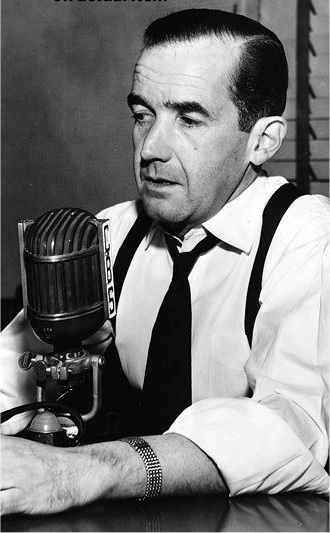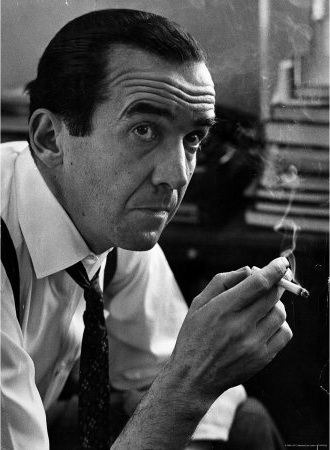Your Public Square Disclosing what is True, what is Real
Edward R. Murrow (1908 - 1965)
Publisher's note: We believe the subject of history makes people (i.e., American people) smarter, so in our quest to educate others, we will provide excerpts from the North Carolina History Project, an online publication of the John Locke Foundation. This fifty-third installment, by Jonathan Martin, was originally posted in the North Carolina History Project.
Egbert Roscoe Murrow
 was born in Polecat Creek, North Carolina, in Guilford County on April 25, 1908. The youngest of three sons, Egbert spent his first six years in the Tar Heel State. In 1913, Roscoe Murrow moved his Quaker family to Blanchard, Washington, and at first it was tough for the Murrow family to acclimate to their new way of life. However, Egbert changed his name to Edward when a teenager, and he excelled at sports and participated in school plays and the debate team.
was born in Polecat Creek, North Carolina, in Guilford County on April 25, 1908. The youngest of three sons, Egbert spent his first six years in the Tar Heel State. In 1913, Roscoe Murrow moved his Quaker family to Blanchard, Washington, and at first it was tough for the Murrow family to acclimate to their new way of life. However, Egbert changed his name to Edward when a teenager, and he excelled at sports and participated in school plays and the debate team.
After his graduation from high school, Edward followed his father's path and became a logger in the Olympic Mountains of Washington. There, Edward became acquainted with the lumberjack culture, learning the coarse language and smoking habits of his fellow loggers. After two years, Edward left the logging profession and attended college at Washington State. Although the young Murrow originally sought a pre-law degree, Ida Anderson, his public speaking teacher, inspired Edward to pursue a future in broadcasting.
Murrow graduated in 1930, and the ambitious communicator and President of the National Student Federation later moved to Washington, D.C., where he advocated for new student exchange programs with the International Institute of Education. Five years after his time with the National Student Federation, Murrow accepted a prestigious job as a director of talks for the Columbia Broadcasting System (CBS). As events fell into place for the start of the second World War, Murrow was commissioned to Europe to report on the war. His first report came in 1938 from Vienna. In his account, Murrow briefed audiences in America on Hitler's invasion of Austria, and he gave detailed descriptions of the setting, people, and visions of the street.
In the early 1940s,
 Murrow traveled to London and started to broadcast his accounts of the war from the British Broadcasting Corporation (BBC)'s Broadcast House. While he was stationed in London, Murrow released late night reports and he began each narrative with the iconic opening, "This...is London." When Murrow was asked about his trademark statement and the pause after "this", he said that Ida Anderson advised that during the opening he should pause after the first word. Some of his most detailed and best accounts are from his Britain broadcasts. Here is one report from a rooftop in London on September 22, 1940: "Down below in the streets I can see just that red and green wink of the traffic lights; one lone taxicab moving slowly down the street. Not a sound to be heard. As I look out across the miles and miles of rooftops and chimney pots, some of those dirty-gray fronts of the buildings look almost snow-white in this moonlight here tonight."
Murrow traveled to London and started to broadcast his accounts of the war from the British Broadcasting Corporation (BBC)'s Broadcast House. While he was stationed in London, Murrow released late night reports and he began each narrative with the iconic opening, "This...is London." When Murrow was asked about his trademark statement and the pause after "this", he said that Ida Anderson advised that during the opening he should pause after the first word. Some of his most detailed and best accounts are from his Britain broadcasts. Here is one report from a rooftop in London on September 22, 1940: "Down below in the streets I can see just that red and green wink of the traffic lights; one lone taxicab moving slowly down the street. Not a sound to be heard. As I look out across the miles and miles of rooftops and chimney pots, some of those dirty-gray fronts of the buildings look almost snow-white in this moonlight here tonight."
After the war, Edward Murrow, now an established CBS reporter, became head of the CBS's news organization. During this time he established radio programs such as As Others See Us, You Are There, and Hear It Now. The later news program became a notable radio news magazine that covered numerous cultural subjects in its hour long broadcasts. In 1952, Murrow and fellow producer Fred Friendly, decided to begin the See It Now program, a television version of its radio counterpart. On March 9, 1954, the most influential and famous See It Now episode aired on the misdeeds of Senator Joseph McCarthy. Murrow's signature phrase from his television program was, "Good night and good luck."

Edward R. Murrow began with CBS as a young man and stayed with the network for nearly his entire career: Above.
Murrow's relationship with CBS eventually fell apart because of his criticism of the organization's television programs. From 1961 until 1964, Murrow became the head of the U.S. Information Agency during John F. Kennedy's administration. He later achieved the Medal of Freedom for his contributions to news broadcasting, and the Queen of England knighted Murrow for his service to Britain during World War II. Murrow passed away at the age of fifty-seven on April 27, 1965, due to his lung cancer; Murrow was known for his chain smoking.
Many historians and broadcasters consider Edward Murrow the best commentator to grace the airwaves. Murrow's creativity and boldness along with his concise yet precise use of language succeeded in drawing in numerous listeners from around the world. Audiences tuned into Murrow's program because he engaged the controversial issues that the fearful avoided. Some of his best reports, such as the broadcast during the Battle of Britain and his television program, See It Now, during the Red Scare, became the basis for the future of American broadcasting. Dan Rather, past CBS news anchor, referred to Murrow as "the best reporter of his generation. The best reporter in broadcasting or print."
Sources:
"Edward Murrow." Funk & Wagnalls New World Encyclopedia. World Almanac Education Group, Inc. (2002).
"On the Right Wavelength." David Culbert. History Today. (2006): Vol. 56, Issue 2.
"Call It Courage." Dan Rather, Anchorman. CBS News. Speech - Miami, Florida. September 29, 1993.
"Edward R. Murrow." North Carolina Highway Historical Marker Program website. A Division of the North Carolina Department of Cultural Resources. http://www.ncmarkers.com/Results.aspx?k=Search&ct=btn, (accessed October 31, 2011).
"Murrow, Edward R. (1908 - 1965)." Encyclopedia of Television News. Greenwood Publishing Group, 1999.
Go Back
Egbert Roscoe Murrow

Edward R. Murrow: Above.
After his graduation from high school, Edward followed his father's path and became a logger in the Olympic Mountains of Washington. There, Edward became acquainted with the lumberjack culture, learning the coarse language and smoking habits of his fellow loggers. After two years, Edward left the logging profession and attended college at Washington State. Although the young Murrow originally sought a pre-law degree, Ida Anderson, his public speaking teacher, inspired Edward to pursue a future in broadcasting.
Murrow graduated in 1930, and the ambitious communicator and President of the National Student Federation later moved to Washington, D.C., where he advocated for new student exchange programs with the International Institute of Education. Five years after his time with the National Student Federation, Murrow accepted a prestigious job as a director of talks for the Columbia Broadcasting System (CBS). As events fell into place for the start of the second World War, Murrow was commissioned to Europe to report on the war. His first report came in 1938 from Vienna. In his account, Murrow briefed audiences in America on Hitler's invasion of Austria, and he gave detailed descriptions of the setting, people, and visions of the street.
In the early 1940s,

Edward R. Murrow with his trademark cigarette: Above.
After the war, Edward Murrow, now an established CBS reporter, became head of the CBS's news organization. During this time he established radio programs such as As Others See Us, You Are There, and Hear It Now. The later news program became a notable radio news magazine that covered numerous cultural subjects in its hour long broadcasts. In 1952, Murrow and fellow producer Fred Friendly, decided to begin the See It Now program, a television version of its radio counterpart. On March 9, 1954, the most influential and famous See It Now episode aired on the misdeeds of Senator Joseph McCarthy. Murrow's signature phrase from his television program was, "Good night and good luck."

Murrow's relationship with CBS eventually fell apart because of his criticism of the organization's television programs. From 1961 until 1964, Murrow became the head of the U.S. Information Agency during John F. Kennedy's administration. He later achieved the Medal of Freedom for his contributions to news broadcasting, and the Queen of England knighted Murrow for his service to Britain during World War II. Murrow passed away at the age of fifty-seven on April 27, 1965, due to his lung cancer; Murrow was known for his chain smoking.
Many historians and broadcasters consider Edward Murrow the best commentator to grace the airwaves. Murrow's creativity and boldness along with his concise yet precise use of language succeeded in drawing in numerous listeners from around the world. Audiences tuned into Murrow's program because he engaged the controversial issues that the fearful avoided. Some of his best reports, such as the broadcast during the Battle of Britain and his television program, See It Now, during the Red Scare, became the basis for the future of American broadcasting. Dan Rather, past CBS news anchor, referred to Murrow as "the best reporter of his generation. The best reporter in broadcasting or print."
Sources:
"Edward Murrow." Funk & Wagnalls New World Encyclopedia. World Almanac Education Group, Inc. (2002).
"On the Right Wavelength." David Culbert. History Today. (2006): Vol. 56, Issue 2.
"Call It Courage." Dan Rather, Anchorman. CBS News. Speech - Miami, Florida. September 29, 1993.
"Edward R. Murrow." North Carolina Highway Historical Marker Program website. A Division of the North Carolina Department of Cultural Resources. http://www.ncmarkers.com/Results.aspx?k=Search&ct=btn, (accessed October 31, 2011).
"Murrow, Edward R. (1908 - 1965)." Encyclopedia of Television News. Greenwood Publishing Group, 1999.
| Friday Interview: Celebrating the Monuments Men of WWII | NC Past, In the Past, Body & Soul | Plank Roads |





















